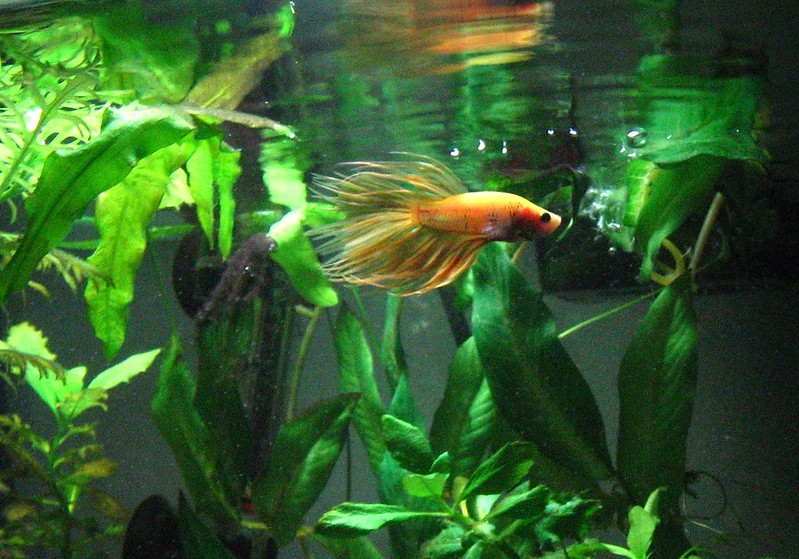Betta Fish Fin Loss
Most Betta fish owners have had the opportunity to face the loss of their pet’s fins. It is a very common occurrence in Betta fish’s life, and is mostly a symptom of infection.
However, the loss of fins in Betta fish can be caused by various phenomena, not only dangerous bacterial infections. The most common cause is improper aquarium care and badly maintained accessories such as filters, heaters, or ornamental plants and shells.
Fortunately, there is a solution and a cure, if the loss of fins is noticed in time and if you find out why exactly Betta fish loses its fins.
Don’t relax too much, but read below what can cause fin loss and how you can prevent it relatively easily.
There are two main reasons for the loss of fins in Betta fish: external factors, such as improper and incomplete hygiene and bacterial infection. Often, however, these two ways are connected.
Fin Rot
Fin rot is a bacterial infection and if not treated in time, the whole body of Betta fish will eventually start to rot. The causes are gram-negative bacteria or fungi. Both pathogens are regular residents of the aquarium water and if your Betta has a strong immune system – it will be fine.
However, if Betta is weak and in poor health – the immune system will not be able to protect her from these microorganisms and Betta will get sick. The cause of a weak immune system and eventually infection lies in uninformed or irresponsible owners. Incorrect filters that cause strong water current; Also inadequate water temperature, too many plants and decorations, and irregular hygiene – all this can cause this dangerous disease.

Betta fish is very sensitive to stress, which further leads to a weakening of the immune system and infection.
For Betta to heal successfully it is important to spot it all in time. Initially, symptoms are mild, such as lightly streaked fins, black or whitish edges, and white spots. Over time, the fins will fall off and the blackness or rot will spread along Betty’s body. It is very difficult to treat this disease if it affects the internal organs or the Betta almost completely loses its fins.
How To Treat Fin Loss?
Most experienced experts agree that when you notice rot, transfer the Betta fish to a hospital tank and put aquarium salts in the water. Betta fish is generally difficult to tolerate medication, but if the symptoms are very severe and the disease has progressed – they are your last option.
The Crowd In The Aquarium
Maybe you have a small aquarium and a lot of fish of different species. You probably also have decorations, plants, pebbles, castles, shells and all that together creates a lot of confusion for all the fish.
Bette is sensitive to everything, especially to a small aquarium. The basis of proper care for a Betta fish is a large aquarium, and if it must have the company of other fish species – they must be character-compatible.
Otherwise, there may be a fight that can cause injuries to Betta fish and even the loss of feathers.
Rough stones and gravel, as well as plants with sharp leaves and edges – can also cause injuries and loss of feathers. Betta fish like to show off their colorful fins and impose themselves narcissistically.
It is important that all decorations and any accessories in the aquarium are adapted to the delicate fins of Betta fish.
Self-Harm
It may sound funny or weird to you, but Betta fish can also be self-destructive. The trigger for such behavior is the accumulated stress and general non adaptation to the environment. Some Betta fish bite their fins, and some dig into the walls of the aquarium or decorations.
All this leads to the fin loss, and even more serious injuries. Some veterinarians say it could be hereditary. Betta fish are originally called Siamese fighters and aggression is something that has helped them through evolution. The appearance of self-harm may be a remnant of such an instinct, which in this case is self-directed.
Is Fin Loss Curable?
Yes, but the chances of a cure are higher if you find out the cause in time.
Prevention is always important, not only when it comes to fin loss, but in general. For your Betta fish to have the strongest possible immune system – proper nutrition is important, as well as a carefully created environment in the aquarium.
If the fin loss is caused by an infestation, the treatment will last and be successful depending on the stage of development of fin rot. Such an infection requires a slightly more serious approach, and often the use of medication.
If the cause is injury or stress – it is relatively easy to solve. All you need to do is improve the conditions in the aquarium.
Here is what you can do.
Pay Attention To Water Quality And Temperature
It is always important to point out how essential water in the aquarium is for the health of Betta fish.
It is their basic and only environment and without water, all the fish, even Betta, would die. In most problems and diseases that are typical for Betta fish – the trigger is mostly faulty water.
That means, inappropriate temperature, too strong flow, water polluted with algae and with an excessive percentage of ammonia and nitrates. Such an environment is ideal for the development of fungi, bacteria and other microorganisms that can significantly harm Betta fish.
That is why it is important to regularly check the parameters of heaters, filters and thermostats and to test the water for ammonia and nitrates. Remember: the ideal water temperature in the aquarium for Betta fish is between 78 and 81 degrees Faraday.
Change 23% of the water every week; so Betta will always have ideal water, without experiencing stress.
Feed Betta A Varied And Quality Food
When it comes to feeding and even taking care of Betta fish in general – you can be guided by logic similar to that of humans. So, feed the Betta with a variety of food. This is the only way to ensure Betta fish have a strong immune system. Buy Betta fish specialized food, not any, which is marked “For fish”. A variety of foods provide enough protein, minerals and vitamins to maintain the immune system. This means that you feed Betta pellets, flakes, but also live food, especially daphnia. A variety of foods will prevent constipation as well as other digestive problems.
Daphnia
Daphnia is probably a favorite food of Betta fish. They literally adore her. Daphnia helps them avoid constipation and provides vitamin B and essential minerals. You can feed Betta fish with daphnia for three weeks after they hatch from the eggs and continue for the rest of their lives.
It will not harm them if you give them the recommended dose of 1.8 grams per day. You can buy daphnia live, frozen, and lyophilized or you can grow them yourself. Be careful when buying live daphnia and look for a verified supplier. Otherwise, you could transmit harmful microorganisms or even the tuberculosis bacterium.
Aquarium Salt And Sedatives
If the loss of your Betta fish’s fins isn’t terrible and it is not a dangerous infection – you may solve the problem by changing the water and adding aquarium salt. It will strengthen the natural mucus secreted by Bettina’s fins and thus make the fins more resistant to bacteria and other potentially dangerous parasites. It will also improve water quality and soothe your Betta.
You can also add API Stress Coat – a specialized conditioner for aquarium water. This supplement will improve water, reduce stress and aggression in Betta fish and also improve the quality of Betta’s fins.
How Long Does It Take For Betta’s Fins To Grow Back?
If the recovery is going well and if you have removed from the aquarium everything that can stress the Betta fish and hinder the recovery – Betta’s fins can be recovered.
Depending on what caused the fine loss and how much damage was done – the process of re-growth of fins will take from a few weeks to several months.
On average, fins grow at a rate similar to that of a human nail. During recovery – the fins will be very tender and fragile and all parameters in the aquarium must be ideal.
It is especially important that the objects are not sharp and that there is no other fish that Betta could fight. Carefully monitor your Bette’s appearance and behavior during the recovery process.
The new fin will be thin, pale, and significantly different from the ones you are used to, but that is part of the process. You will know that everything is going according to plan and Betta’s behavior. If it shows no signs of fatigue or lethargy eats normally – everything is probably fine with the new fins.
Conclusion
Betta fish require a lot of responsible care. This means that if you truly want to enjoy your pet, colorful and luxurious fins – you have to give them the best of the best. That may sound expensive, but it’s not. It is much simpler and cheaper than treating and constantly caring for a Betta fish that has gotten sick. Of course, you can cure fin loss, but prevention is always simpler and less painful for both Betta and the owners.

